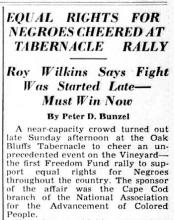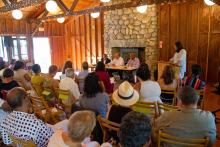Building One America is our most important mission...Money cannot buy it. Power cannot compel it. Technology cannot create it. It can only come from the human spirit.
- President Clinton, June 14, 1997.
Members of the Unitarian Universalist Society of Martha's Vineyard recently assembled for a Sunday worship service that was typical for the congregation. It began with brief community announcements, a hymn and the lighting of a chalice.
But when it was time for the sermon, something different happened. Instead of one minister taking time to talk about the Bible or God or even Martin Luther King Jr., as is the tradition on the second Sunday of the year, the Rev. Bruce Kennedy and two guest speakers each told stories about racial injustice and about "conversations" on race they have had during their lives. When they were done, other members of the congregation also spoke, taking turns voicing their own memories and feelings on the issue.
It was an open Conversation on Race, the first in a formal series on Martha's Vineyard.
These conversations are taking place in conjunction with a national effort started by President Clinton last summer. As part of the effort, the President has sponsored conversations that have been broadcast nationally and has encouraged individual communities to launch their own dialogues. In response, several Island groups came together to coordinate a local effort.
For some, it is exciting to be part of a national program. But for the Unitarian congregation, the conversation was its own reward.
"It was just a wonderful, wonderful Sunday," Rev. Kennedy said. "There were members of the congregation that I've known since I've been here who shared some stories of things in their lives, where they had dealt with issues of social justice...that I hadn't heard before. It was a very, I think, enlightening and enriching Sunday for everyone who was there."
So far, it's good feedback for a group of Island people who have been intrigued with the President's initiative.
Last summer, Mr. Clinton announced that he wanted to lead the nation in a "great and unprecedented" conversation on race. The initiative, which is supported by a federal commission and staff in Washington, D.C., so far has included national forums hosted by the President, as well as smaller forums in individual communities. It is called by several names, including One America and the national Conversation on Race.
Specific guidelines are available. At an office in Washington, where the staff answers the phone with the greeting, "the President's Initiative on Race," written materials are available to any town or city leaders who want to conduct conversations in their communities. Local leaders are also encouraged to respond in writing, with descriptions of their conversations and recommendations on how the federal government should act on race-related issues.
On the Vineyard, the idea was talked about with interest among executive board members of the NAACP, for several reasons.
"One, we believed in what this One America program is all about," said Freddy Rundlet, a member of the board. "Two, we felt it was of value and beneficial for the community to have these conversations. And three, because of the relationship Martha's Vineyard has with the President, we thought it behooved us to be able to provide him with some summation report, maybe when he comes this summer. And the last reason is, we thought it was the right thing to do.
"At the very least it's going to make for a healthier community and that's one of the prime things we're concerned about."
Since voting late last year to move forward with a local conversation, the NAACP board has been joined by representatives of several other organizations. Those groups include the Wampanoag Tribe of Gay Head (Aquinnah), the All Island Clergy Association, the Island Councils on Aging, the regional school committee, the regional high school's cultural club, the Island police departments and the chamber of commerce.
Representatives have been meeting weekly to plan the series of conversations, which will be both big and small, and probably will include at least one very large forum that will be open to all Island residents.
The committee is also willing to help in a range of ways. That is, the committee is more than willing to simply offer informal advice on setting up a private conversation. Or, if a group wants to become more closely involved and would like help, the committee will organize the conversation, moderate and take notes for an official report.
"We would be there to meet with them, and actually help them on how to put together a format for having a conversation, to lead the group or be a facilitator, and anything else we need to do," Mr. Rundlet said.
"It's a very simple thing. The point of the matter is just to get a group of people in a space so that they can have a conversation. So there's no real ground rules other than someone should speak and someone should listen, realizing you can get into some emotional issues."
People may get emotional, but not in an unpleasant way, said George Tankard, who was a guest speaker at the Unitarian church.
He also attended an informal conversation Tuesday at the West Tisbury senior center. The senior center has had such discussions before, but this week Mr. Tankard attended it for the first time, at the request of the group.
"It seemed to go well," he said. "It's such an open conversation that, how can I say it, any misbegotten ideas that you may have about people of various races can be brought out and discussed...The conversation, the one on Tuesday, no one got angry. There were some people who had some wild and crazy ideas...but the rules were that people were able to express themselves but no one became angry. Some very interesting things came out of it."
Mr. Rundlet hopes that other productive conversations will follow, "giving people an opportunity to speak, and an opportunity to learn from each other."
"This country was founded on, 'Bring me everybody,' " he said. "We've got to get used to the fact that this is no longer a white nation...We would hope that because the Vineyard is a special place that what we do can be [repeated] throughout the country."







Comments